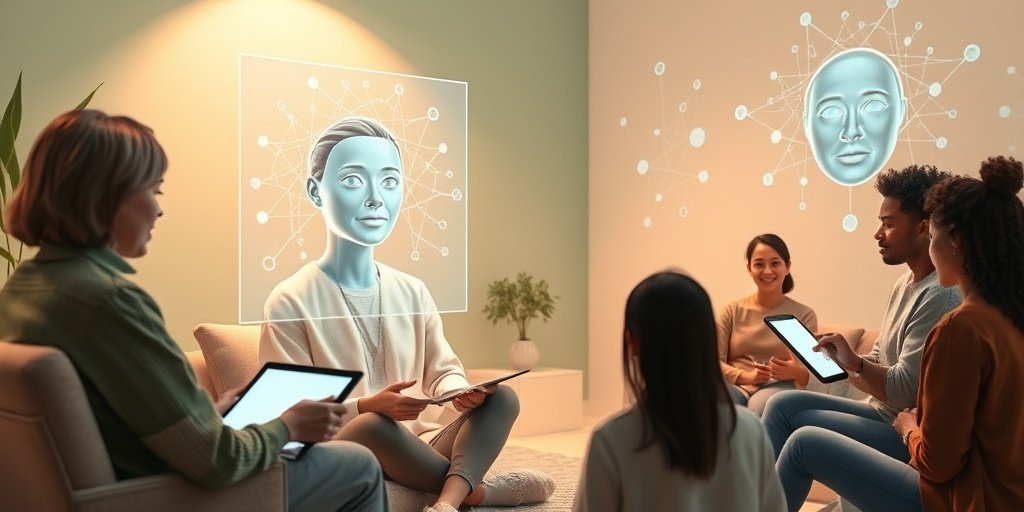⚡ Quick Summary
This article explores the ethical implications of using generative artificial intelligence (GenAI) in the democratization of mental health care. It emphasizes the need for a balanced approach that considers both the benefits and risks associated with GenAI technologies in mental health practice.
🔍 Key Details
- 📚 Focus: Ethical considerations in GenAI for mental health
- 🌐 Context: Historical evolution of information accessibility
- ⚙️ Technology: Generative AI, including large language models
- 📝 Proposed Tool: Strategic questionnaire for assessing AI applications
🔑 Key Takeaways
- 💡 GenAI technologies represent a new phase in the democratization of mental health.
- 🌍 Improved accessibility to mental health care is a significant potential benefit.
- 🤝 GenAI can facilitate a flattening of traditional hierarchies between providers and patients.
- ⚠️ Ethical risks and challenges must be carefully navigated.
- 🛠️ A strategic questionnaire is proposed to evaluate AI-based mental health applications.
- 👥 Active engagement of mental health professionals is crucial in guiding GenAI development.
- 🔄 Balance between technological advancement and ethical considerations is essential.

📚 Background
The democratization of information has transformed how knowledge is accessed and shared, particularly in the field of mental health. Historically, access to mental health resources was often limited to professionals and institutions. However, the rise of the internet and open-source movements has paved the way for broader access. Now, with the advent of generative AI technologies, we are entering a new era where information and advanced tools are more readily available than ever before.
🗒️ Study
This paper provides a sociohistorical perspective on the integration of GenAI in mental health, examining how these technologies can enhance accessibility and personalization in care. It also discusses the ethical implications of such integration, highlighting the need for a thoughtful approach to ensure that advancements are beneficial and patient-centered.
📈 Results
The findings underscore that while GenAI can improve access to mental health care and facilitate personalized responses, it also poses significant ethical challenges. The proposed strategic questionnaire aims to assess both the potential benefits and risks of AI applications in mental health, ensuring that ethical considerations are at the forefront of GenAI development.
🌍 Impact and Implications
The integration of GenAI in mental health care could revolutionize how services are delivered, making them more accessible and tailored to individual needs. However, it is crucial to address the ethical implications to prevent misuse and ensure that these technologies enhance rather than hinder patient care. The active involvement of mental health professionals in guiding the development of GenAI is essential for achieving a balance between innovation and ethical responsibility.
🔮 Conclusion
This article highlights the transformative potential of generative AI in democratizing mental health care while emphasizing the importance of ethical considerations. As we move forward, it is vital to engage mental health professionals in the development of these technologies to ensure they are both effective and ethically sound. The future of mental health care could be significantly improved through responsible GenAI integration, paving the way for better patient outcomes.
💬 Your comments
What are your thoughts on the role of generative AI in mental health care? We invite you to share your insights and engage in a discussion! 💬 Leave your comments below or connect with us on social media:
An Ethical Perspective on the Democratization of Mental Health With Generative AI.
Abstract
Knowledge has become more open and accessible to a large audience with the “democratization of information” facilitated by technology. This paper provides a sociohistorical perspective for the theme issue “Responsible Design, Integration, and Use of Generative AI in Mental Health.” It evaluates ethical considerations in using generative artificial intelligence (GenAI) for the democratization of mental health knowledge and practice. It explores the historical context of democratizing information, transitioning from restricted access to widespread availability due to the internet, open-source movements, and most recently, GenAI technologies such as large language models. The paper highlights why GenAI technologies represent a new phase in the democratization movement, offering unparalleled access to highly advanced technology as well as information. In the realm of mental health, this requires delicate and nuanced ethical deliberation. Including GenAI in mental health may allow, among other things, improved accessibility to mental health care, personalized responses, and conceptual flexibility, and could facilitate a flattening of traditional hierarchies between health care providers and patients. At the same time, it also entails significant risks and challenges that must be carefully addressed. To navigate these complexities, the paper proposes a strategic questionnaire for assessing artificial intelligence-based mental health applications. This tool evaluates both the benefits and the risks, emphasizing the need for a balanced and ethical approach to GenAI integration in mental health. The paper calls for a cautious yet positive approach to GenAI in mental health, advocating for the active engagement of mental health professionals in guiding GenAI development. It emphasizes the importance of ensuring that GenAI advancements are not only technologically sound but also ethically grounded and patient-centered.
Author: [‘Elyoseph Z’, ‘Gur T’, ‘Haber Y’, ‘Simon T’, ‘Angert T’, ‘Navon Y’, ‘Tal A’, ‘Asman O’]
Journal: JMIR Ment Health
Citation: Elyoseph Z, et al. An Ethical Perspective on the Democratization of Mental Health With Generative AI. An Ethical Perspective on the Democratization of Mental Health With Generative AI. 2024; 11:e58011. doi: 10.2196/58011